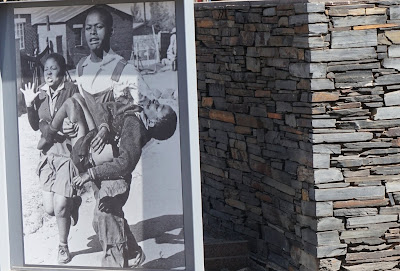Entrepreneurs find a way under even difficult circumstances. We had a great lunch at a small restaurant/hotel that the Smithsonian tours use to provide a meal while in Soweto. The woman hosting us described the many struggles she experienced to solicit backers for what has become a successful venture.
One of our experiences in Soweto was visiting the Hector Peterson museum. The museum is named for a high school boy shot during student demonstrations against some of the policies of apartheid. The primary complaint concerned a requirement that courses be taught in Africaans - a language many students did not know. Hector's dead body was captured in an infamous picture widely distributed following the aggressive response to the demonstrations.
We had the opportunity to talk to the now grown women who was Hector's sister (shown in the picture above).
One of her concluding comments I used in a previous post. She described South Africa as attempting an experiment in democracy. South Africans are quite aware of the present political situation in the U.S. - satellite dishes top even the most humble dwellings. She added that we seem to be still experimenting as well.
Time to plan for our next adventure. Thanks for reading. We hope you have similar opportunities to explore.





No comments:
Post a Comment